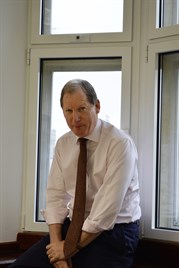 Read the peer reviews for this feature.
Read the peer reviews for this feature.
Download the graphs for this feature.
Sir David Higgins’ Rebalancing Britain report, presented in October, was another big milestone in the journey of HS2, following his earlier HS2 Plus report in March.
A year has passed since the former Network Rail chief executive - and mastermind of the Olympic Games construction programme - took on a role that some say had his name on it all along.
Has Higgins’ appointment changed anything fundamental about the way HS2 is perceived, or is it simply building on the way that HS2 is starting to be perceived by politicians, stakeholders and all the people needed to make it work?
Arguably, one of the most influential people at the centre of these conversations is HS2 Director of Strategic Communications Tom Kelly - another person who might have been naturally predisposed towards such a role.
To say he is simply a PR man would be an enormous underestimation of Kelly, a one-time chief spokesman for none other than former Prime Minister Tony Blair, with a background in major infrastructure projects from a similar role at Network Rail as well as for the construction of Heathrow Terminal 5.
For someone so close to the corridors of power, Kelly, a one-time journalist for both the Belfast Telegraph and the BBC, and Director of Communications at the Northern Ireland Office, cuts a friendly figure. And having supported Prime Minister Tony Blair during the Northern Ireland peace process, he’s more than used to dealing with difficult, complex negotiations involving challenging characters in pursuit of a grand aim.
The late Reverend Dr Ian Paisley once implied that Kelly made Machiavelli “look like a rank amateur”, after plans for an unprecedented PR offensive to secure a Yes vote in the referendum on the Belfast agreement back in 1998 became public. He accused Kelly of attempting to manipulate public opinion. The answer as to whether or not that is true probably lies somewhere within the National Archives, but history nevertheless points to a relatively peaceful existence in Northern Ireland in the past 15 years.
After that came the initially shaky but now well established Terminal 5, then a slicker and more confident Network Rail six months into the latest five-year plan to rebuild Britain’s railway. Bring on the next challenge… HS2.
“If I look back over the last year, I think it has been a process of explaining better from our point of view why HS2 is necessary,” he says.
“But also explaining better what the price is of not doing HS2, both in terms of capacity and connectivity. And more widely than that the North-South divide, and the balance within the British economy.
“From our point of view, I hope last year has also been about listening better to the views of those on the ground. One of the joys for me personally has been travelling up and down the country listening to the views of local representatives, whether politicians or business people, about the impact for good - and, in some cases, for not so good - of HS2, and trying to respond.
“I hope the two reports, HS2 Plus and Rebalancing Britain, reflect that.”
Nevertheless, there remains a well-organised, articulate and well-funded opposition to HS2 in some quarters. Does Kelly sense a shift from those who seek outright political opposition, and who practice outright political opposition, to those who are now simply seeking mitigation and measures put in place by HS2 to enhance its impact upon the community? MPs, local councils, campaign groups and others have all made their position clear.
“First and foremost, I don’t in any way object to people raising questions about HS2, because I think that process of challenge - and us having to respond to that challenge - has actually made the project better over the past year. And whether I like it or not, that process will continue all the way through the project, because that is the nature of big strategic projects such as this.
“Of course, there will be people for whom HS2 will have an impact on their personal lives; their daily lives. For them it is difficult to see beyond that, and I accept that.
“And we have to treat those people fairly, with respect, and respond accordingly. We cannot in any way be dismissive, either of those individuals or of the wider debate, when people say this will cost an awful lot of money, take an awful lot of commitment from the country over a prolonged period, and ask is it worth it?”
While the second and third readings of the High Speed Rail Bill, which when passed will provide the powers to build Phase 1 of HS2, were afforded a healthy majority, the politics of HS2 remain sensitive. The project is far from home and dry. What has Kelly picked up, in HS2’s dealings with politicians and key stakeholders, about the way HS2 is perceived by parliamentarians? Has Kelly sensed a shift in the past year?
Of the second reading and debate in the House of Commons, he says it “genuinely was a privilege to sit through that, because it was a proper debate, in which MPs on all sides of the house were expressing their views both as constituency MPs, but also as national representatives”.











